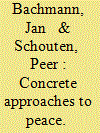| Srl | Item |
| 1 |
ID:
158715


|
|
|
|
|
| Summary/Abstract |
Do roads literally lead to peace? While seemingly a strange question to ask, today's peacebuilders certainly seem to think so. After decades of focus on questions of governance, today, instead, infrastructure primes in state- and peacebuilding missions in many fragile and conflict-affected societies. Peacebuilding efforts in places ranging from Somalia to Afghanistan to the Congo are, to a considerable extent, interventions in the built environment. While infrastructure has always been around in post-conflict reconstruction, today, infrastructure is mobilized during ongoing conflict, invested with aspirations of improving security and stability. To be sure, infrastructure played a big role in the formation of strong western states. But can we take this experience to try and forge political orders of concrete and steel? At a first glance, a theory of change that reorders societies by deploying the hidden powers of the built environment seems compelling, and measurable and concrete infrastructure outputs, additionally, fit perfectly within today's more pragmatic approaches to peace. However, based on examples from across the contemporary global peacebuilding landscape, we show that infrastructure neither amounts to a uniform force, nor is it clear what its impact on peace exactly is. What is certain is that infrastructure is profoundly entwined with contemporary peacebuilding, and that we therefore need to develop novel theoretical angles to come to terms with the ubiquitous politics of infrastructure.
|
|
|
|
|
|
|
|
|
|
|
|
|
|
|
|
| 2 |
ID:
165043


|
|
|
|
|
| Summary/Abstract |
This article examines an important dimension of how states influence each other: by damaging or tarnishing their reputations. It illustrates this form of reputational pressure by analysing the European Union's (EU) efforts to combat tax evasion in Asian financial centres. The aim is to understand changes in the EU's approach to preventing EU-domiciled high net worth individuals (HNWIs) from hiding their wealth in Hong Kong and Singapore, Asia's most important financial centres. The article finds that the deliberate deployment of reputational pressure plays a major role in accounting for the isomorphist tendencies of the regulatory architecture governing tax evasion and harmful tax competition. It contextualizes the evolving anti-tax evasion regulatory regime in the EU and tracks its influence on Hong Kong and Singapore. The crackdown on tax evasion has made it more difficult for both cities not to comply with EU regulatory preferences without suffering major reputational damage. The article suggests that the EU and member states have been successful in pressuring Asian financial centres into higher degrees of regulatory compliance.
|
|
|
|
|
|
|
|
|
|
|
|
|
|
|
|